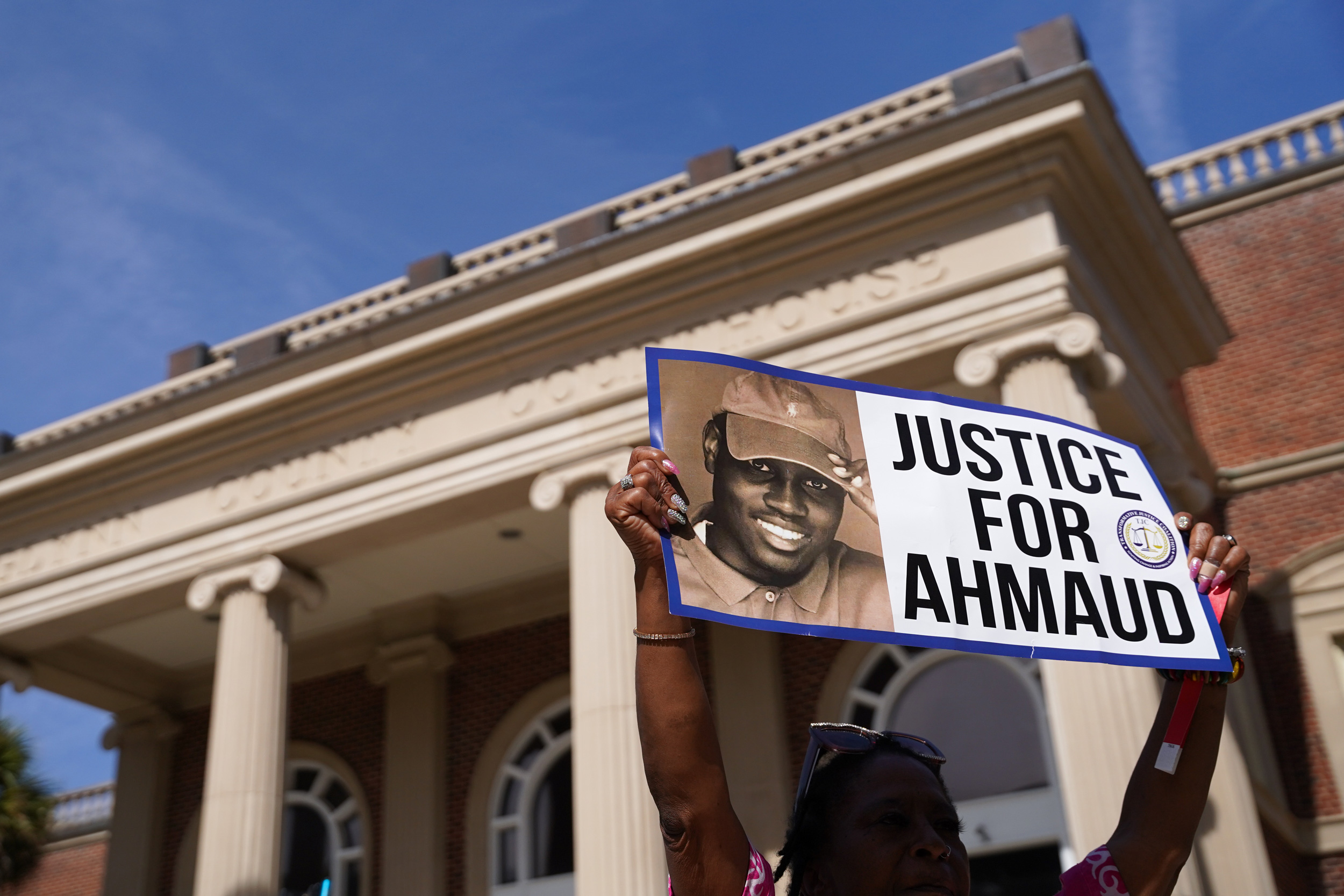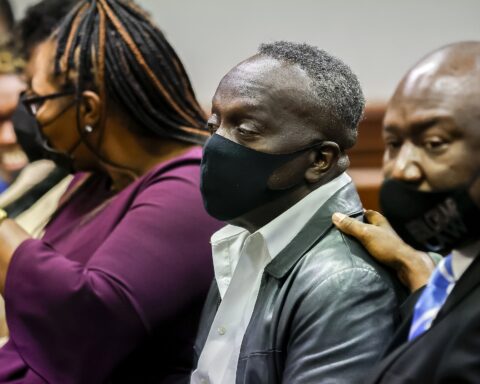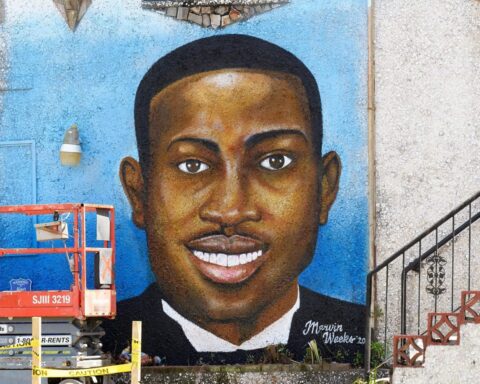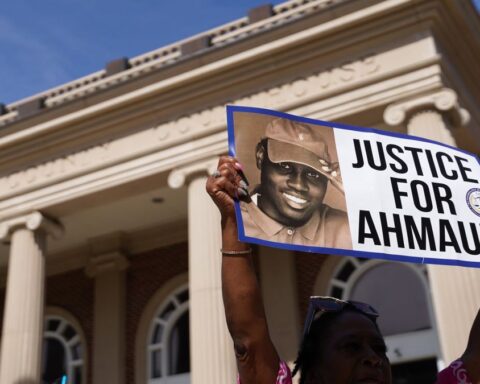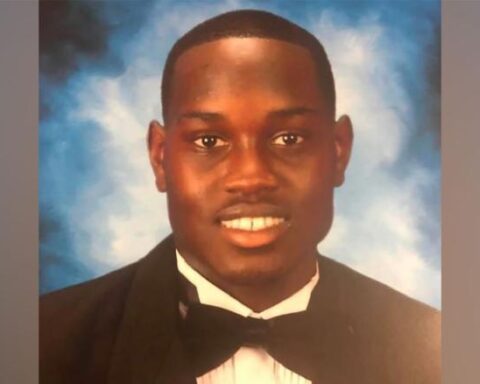Finding jurors to sit in the trial for the three men charged in Ahmaud Arbery’s killing is proving difficult in the Glynn County, Georgia, courtroom where jury selection began this week.
Hundreds of people have been summoned, and from the 60 people who have been questioned since last Monday, many said they have already formed strong opinions about the case, know the defendants or are scared to sit. They point to potential consequences specific verdicts may have on the community.
One prospective juror said that while she doesn’t know much about the case itself, she has seen Facebook headlines and “I run with Ahmaud” bumper stickers across town. She expressed concern about how polarizing the case has been among the community.
“I think it would be naive to think there couldn’t be real world repercussions,” the woman said, adding she wouldn’t let fear stop her from trying to weigh the case fairly.
Those picked will be tasked with deciding whether Gregory McMichael, his son Travis McMichael and their neighbor, William “Roddie” Bryan Jr., are guilty of malice and felony murder. The defendants, who have pleaded not guilty, also face charges of aggravated assault, false imprisonment and criminal attempt to commit false imprisonment.
Arbery, a 25-year-old Black man who was out for a jog in Brunswick, Georgia, was shot and killed on February 23, 2020. The McMichaels said they were conducting a citizen’s arrest on Arbery, who they suspected of burglary, and that Travis McMichael shot him with a shotgun in self-defense.
Bryan, who recorded the video, allegedly hit Arbery with his truck after he joined the McMichaels in chasing Arbery. After the shooting, the three men were allowed to leave the scene and weren’t arrested until the video of the incident was made public more than two months later, sparking outrage and nationwide demonstrations against racial injustice.
“Nobody deserves to be gunned down depending on the situation,” one prospective juror said during questioning, adding he has watched the video in the case and is nervous. “My opinion is Ahmaud was murdered.”
Asked whether he would consider evidence presented in court, the man said he would if it was “legitimate evidence” and added he would try his best to be fair and impartial.
“But, I mean, based on the video, Ahmaud was unarmed and the other two were not. It’s kind of hard to show it’s self-defense there,” he told prosecutors.
Attorneys for Gregory McMichael made it known Monday they want to ask more questions of potential jurors because of what attorney Laura Hogue calls “an unfair system that has been accompanied by movements.”
She specifically mentioned the Justice for Ahmaud mantra, often shouted by demonstrators, which she says encourages a guilty verdict.
The additional questions would include whether the amount of time that elapsed between the date of the incident and the arrests of Gregory and Travis McMichael and William Bryan had any effect on the way the juror may think about the case and whether the potential juror would want someone with the juror’s views and life experience on the jury.
The defense also wants to hypothetically ask if the jury was headed to a not guilty verdict, would they be concerned that verdict would impact their standing in the community, a motion Judge Timothy Walmsley already rejected.
Additionally, defense attorneys want to ask potential jurors in detail about the citizen’s arrest law. The Georgia law has significantly changed since Arbery’s killing and is expected to be a key part of the defense’s case.
Prosecutors seemed surprised by the motion and said they were not prepared to respond. Walmsley also seemed surprised and said he would continue under the current questioning plan until he has a chance to fully look into the motion.
A process longer than usual
Thursday’s roughly 12-hour day concluded the first week of jury selection after attorneys completed three 20-person panels. So far, 23 prospective jurors have been accepted by both the state and defense attorneys for continued consideration.
Twelve jury members and four alternates will be selected for the trial. Jury selection continues this week.
“It could get into next week,” Walmsley, who had earlier appeared to grow frustrated at the slow pace of the review, told qualified potential jurors Thursday. “Possibly into the week after.”
Compared to cases that have not received similar media attention, the time it’s taking to select jurors is “extremely long,” said CNN legal analyst Page Pate.
“For a case that’s this high profile, I would say it’s on the longer side,” Pate said. “The surprise being that … they could only find 23 (people) who were impartial enough just to make it to step number two. That’s unusual. That’s extremely unusual.”
Jason Sheffield, an attorney for Travis McMichael, told CNN the defense has not asked for a change of venue because they believe they will be able to find fair and impartial jurors, “despite the global coverage of this case.”
“To ask for a change of venue, we have to find enough evidence that our jury pool is so tainted that we cannot find a fair and impartial jury,” he told CNN on Friday. “The way we get there is by questioning each and every individual juror, listening to their thoughts and opinions about the case, what they think they know and what they would be willing to consider and whether they would be able to keep an open mind.”
So far, Sheffield said, defense attorneys have been “pleased with the number of jurors that can do this.”
“We will continue to monitor the situation and we will make our daily assessments of whether or not it will be proper to move to change the venue,” Sheffield said.
CNN has reached out to prosecutors for comment.
Pate said he’s not surprised so many of the potential jurors had heard about the case — not only because of the media coverage but because of how small the community is.
“What does surprise me is the number of people who already have a fixed opinion that they’re all (the defendants) guilty,” Pate said.
Many knew Arbery or the defendants
In the small community rattled by the shooting, many who are now being questioned as potential jurors in the trial say they know at least one person in the case.
Kevin Gough, an attorney for Bryan, called the Brunswick community — Satilla Shores, where the shooting took place, is a suburb of that city — a “fishbowl” where everyone knows each other.
One prospective juror said Bryan looked familiar. Another said he knew a neighbor of the McMichaels who was among the first people to arrive on the scene after the shooting. Another person said a family member was among the first responders who was dispatched to the shooting.
One man, who said he met Travis McMichael at a hunting club and has known Bryan for roughly two decades, said that even though he’s not a close friend of either of the two men, knowing them made it difficult for him to serve as an impartial juror.
“Just knowing somebody, yes, it would,” the man said.
Others are familiar with Arbery’s family, with Sheffield noting on the third day of jury selection that a potential juror appeared to give a thumbs up and a nod to the Arbery family on their way out of the courtroom.
At least two dozen potential jurors also indicated to attorneys they had negative feelings against the three men charged in the case.
One woman, when asked why she indicated she has negative feelings against Greg McMichael, replied, “I don’t really know the person, but I have to admit, someone taking someone else’s life to me is a serious offense.”
Others are scared to sit
Other jurors who have gone through the selection process expressed concerns about possible repercussions if they were chosen to serve on the panel set to deliver the verdict in the case.
One potential juror who was questioned said he believed it would be “difficult to change my mind” about whether the three men were guilty (of Arbery’s death). He said he fears there will be only one verdict that’s accepted in today’s climate, and if that verdict is not returned, some may threaten violence “again.”
“The jury is in a tough spot once they’re convened,” the man said.
Fear of violent protests and outside agitators has been a recurring theme for Glynn County residents ever since the video of Arbery’s shooting surfaced. While the community has seen many protests since then, they have all remained peaceful.
While others did not specifically mention concerns over impacts to the community, they said they did not want to serve on the jury, with several telling attorneys they were nervous and some getting emotional during questioning.
One potential juror said, “I don’t feel comfortable. I don’t like crowds and people and pressure.”
